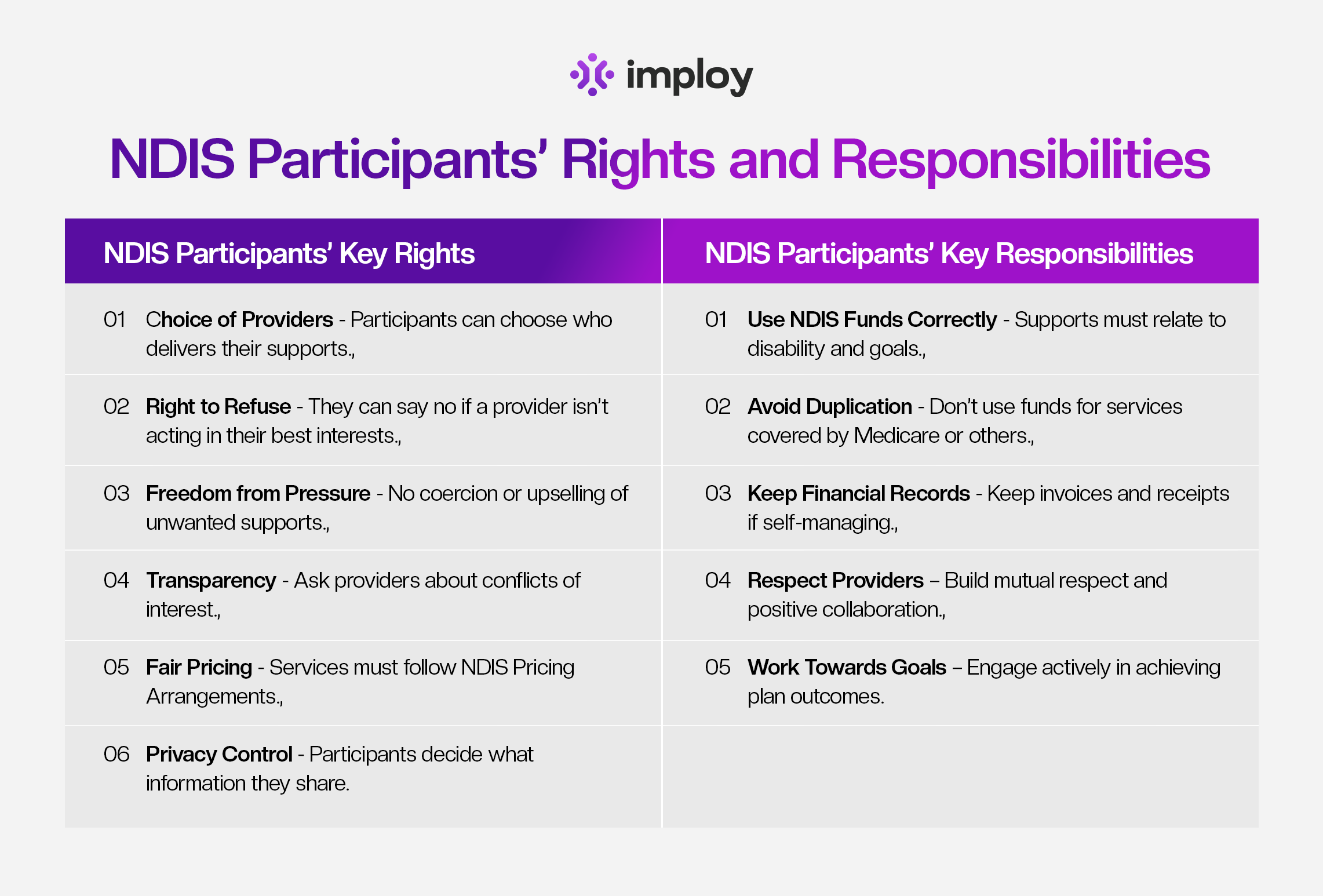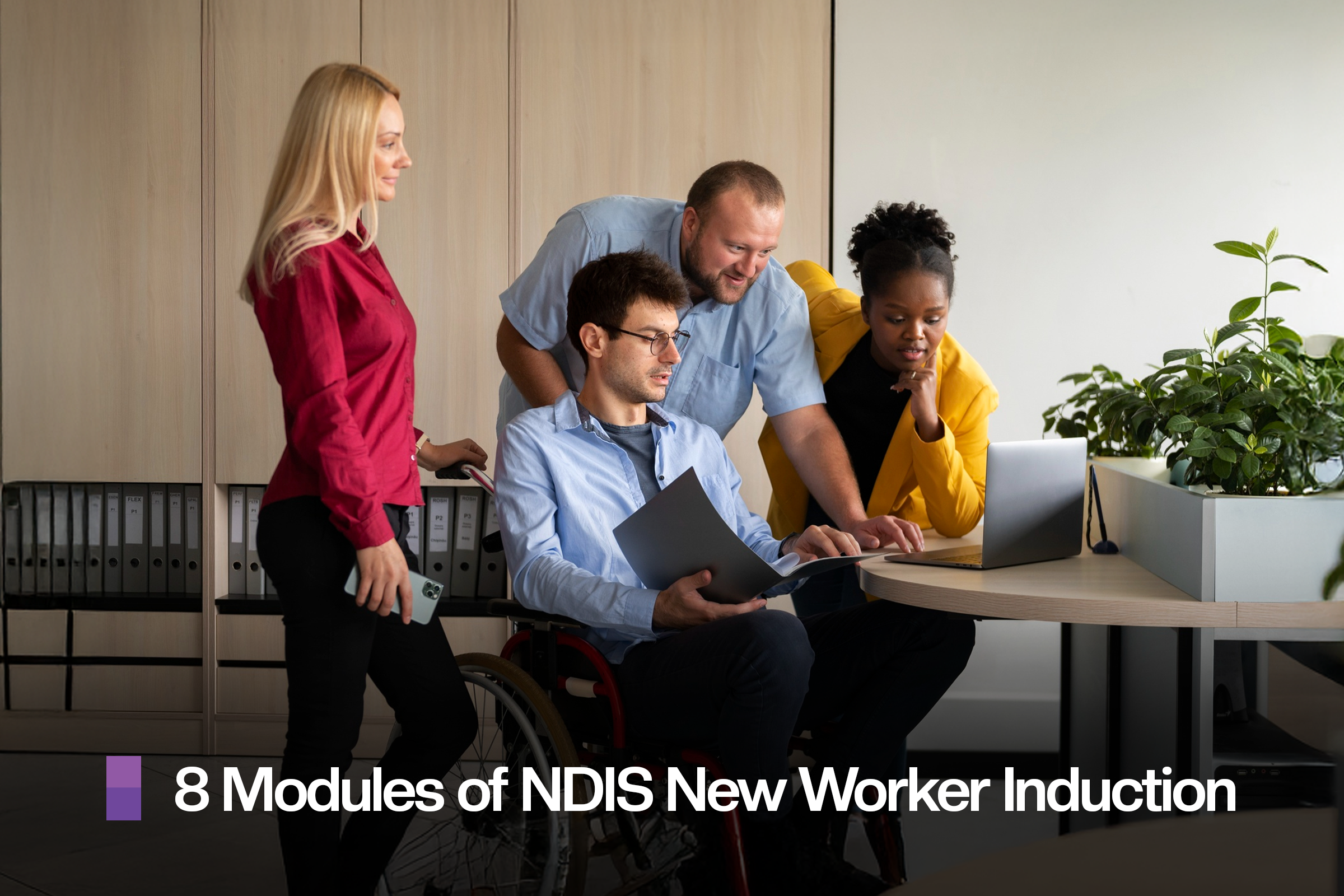Understanding NDIS Participants’ Rights and Responsibilities: What Providers Should Know
Learn NDIS participants’ rights and responsibilities and how providers can stay compliant, build trust, and deliver person-centred care with confidence.

The National Disability Insurance Scheme (NDIS) empowers Australians with disability to have greater choice, control, and independence over the supports they receive. But with that empowerment comes an important framework of rights and responsibilities - not just for participants, but also for the providers who deliver services under the scheme.
For providers, understanding these principles isn’t just about compliance, it’s about building trust, delivering ethical services, and creating better outcomes for participants. Let’s explore what every provider should know.
Why Rights and Responsibilities Matter?
The National Disability Insurance Scheme (NDIS) is grounded in the principles of choice and control, empowering participants to have a say in the services and supports they receive. This approach places individuals at the heart of decision-making, allowing them to choose the care they need and how it is delivered.
However, this empowerment also brings with it an important balance of responsibility. Participants are responsible for using their NDIS funding wisely, ensuring that their choices align with their plan goals, and not exceeding the limits of their funding.
For providers, understanding these principles is more than just about legal compliance - it’s about building a strong, ethical foundation for care. Providers who respect and uphold the rights of participants create transparent, respectful, and safe environments where participants feel valued and supported. This kind of environment fosters trust, collaboration, and satisfaction, which are essential for both the participants and the providers.
When providers understand and uphold these principles, they create transparent, respectful, and safe service environments. It also helps them stay compliant with the NDIS Code of Conduct and NDIS Practice Standards, reducing the risk of audit issues or complaints.

NDIS Participants’ Key Rights
According to the National Disability Insurance Agency (NDIA), every NDIS participant has a set of clear rights designed to protect their dignity, independence, and choice.
As an NDIS provider, it’s essential to understand these rights and ensure your practices - from service delivery to communication - fully reflect them.
Participants have the right to:
- Choose who delivers their support - They can select one or multiple providers and change them at any time.
- Say no to a provider - They don’t have to work with a provider if they believe that provider is not acting in their best interests.
- Be free from pressure or coercion - Participants must never feel pushed into purchasing supports they don’t want or need.
- Ask about conflicts of interest - They can ask if a provider stands to gain personally from offering certain services.
- Receive support at fair and reasonable prices - Prices should comply with the NDIS Pricing Arrangements and Price Limits.
- Control their personal information - Participants decide what information they share and how it is used.
To help providers put these principles into practice, here’s a quick overview of what each right means - and how providers should respond:
For providers, these rights shouldn’t just sit in policy documents - they must come alive in service agreements, communication, and everyday practice. Respecting participant rights isn’t optional; it’s the foundation of ethical, transparent, and compliant NDIS service delivery.
NDIS Participants’ Responsibilities
Just as participants have rights, they also have responsibilities that help ensure the NDIS operates fairly, efficiently, and with integrity.
Understanding these responsibilities is crucial not only for participants but also for providers, who play an important role in guiding and supporting participants to meet them.
Participants are responsible for:
- Using their NDIS funding correctly - Supports must relate directly to their disability and help them achieve their plan goals.
- Avoiding duplication - They should not use NDIS funds for services already covered by another system, such as Medicare or private health insurance.
- Keeping financial records - Self-managed participants must keep invoices, receipts, and bank statements as evidence of how their funds are spent.
- Treating providers and workers respectfully - Positive and effective care relationships rely on mutual respect, communication, and professionalism.
- Working towards their agreed goals - Participants are expected to engage actively in their support and make reasonable efforts to progress toward outcomes.
For providers, having a clear understanding of these responsibilities helps maintain transparency and accountability. It also ensures services are appropriately billed and aligned with what’s considered “reasonable and necessary” under NDIS guidelines - protecting both the participant and the provider.
To help clarify how these responsibilities translate into daily practice, here’s an overview:
By understanding these shared responsibilities, providers can create a more transparent, ethical, and goal-driven care environment - where participants are empowered to take ownership of their supports, and providers remain compliant and trusted partners in their journey.
Putting Rights and Responsibilities into Practice
Every day, NDIS providers play a critical role in ensuring participants’ rights are respected and responsibilities are upheld. Translating principles into concrete actions helps build trust and promotes better outcomes for participants.
Here are some practical steps:
- Create clear and accessible service agreements
Use plain language so participants understand what they’re agreeing to - including how pricing works, how to make complaints, and how to change services. - Offer informed choice and control
Always provide participants with options. Let them decide how, when, and by whom their services are delivered. - Be transparent about pricing and conflicts of interest
Clearly communicate costs and disclose any relationships that might influence service delivery. - Train staff regularly
Ongoing training on the NDIS Code of Conduct and participants’ rights helps maintain high service standards. - Encourage feedback and complaints
Make it easy for participants to share their experiences and take all feedback seriously. - Protect privacy and confidentiality
Handle participant information with care and in line with privacy laws.
By consistently applying these steps, providers can create a safe, transparent, and participant-focused environment that upholds rights, strengthens trust, and ensures high-quality care for everyone involved.
Common Compliance Risks for Providers
Even the most well-meaning providers can sometimes unintentionally make errors that affect participant rights or responsibilities. Being aware of common pitfalls helps providers stay compliant and deliver ethical, high-quality care.
Common risks include:
- Delivering supports that don’t align with the participant’s plan.
- Pressuring participants to buy more services than they need.
- Failing to disclose conflicts of interest.
- Using unclear or unfair pricing.
- Poor record keeping, especially with self-managed participants.
How to avoid these issues:
- Check each participant’s plan before delivering services.
- Keep accurate service delivery and billing records.
- Use transparent pricing aligned with NDIS limits.
- Provide clear documentation and communication at every stage.
By actively managing these risks, providers not only protect themselves but also safeguard participants’ rights, build trust, and ensure a higher standard of care.
How imploy Helps Providers Stay Compliant?
At imploy, we understand the challenges of running a compliant and participant-focused NDIS business. That’s why we’ve developed a wide range of resources, templates, and guides to help providers stay on top of their obligations.
Explore tools such as:
- NDIS Code of Conduct Guide - to understand ethical and legal responsibilities.
- Free NDIS Service Agreement Template - to ensure clarity and compliance in every client agreement.
- Responding to NDIS Audit Guide - to prepare for and pass audits with confidence.
With imploy, providers can simplify compliance and focus on what matters most - delivering high-quality, person-centred care.
Final Thoughts
Understanding NDIS participants’ rights and responsibilities is at the heart of good practice.
When providers respect participant rights and support participants in meeting their responsibilities, they create an environment built on trust, empowerment, and compliance.
By embedding these principles into every aspect of your operations - from service agreements to staff training - you’re not just following the rules; you’re helping participants live more independent and fulfilling lives.
Stay compliant, confident, and participant-focused - explore imploy’s NDIS compliance resources today.
FAQs
1. Can a participant change providers if they’re unhappy?
Yes. Participants have the right to choose who delivers their supports and can change providers at any time.
2. Why is it important for NDIS providers to understand participants’ rights and responsibilities?
Understanding these principles helps providers deliver services that are ethical, transparent, and compliant with the NDIS Code of Conduct. It also builds trust and ensures participants receive the support they deserve.
3. What are the key rights of NDIS participants?
Participants have the right to choose their providers, refuse services, be free from pressure, ask about conflicts of interest, receive fair pricing, and control their personal information.
4: What should providers do if a conflict of interest arises?
Disclose it immediately, provide options, and document how the participant made their decision.
5. How can providers help participants meet their responsibilities?
By explaining plan limits, providing clear invoices, maintaining open communication, and regularly reviewing goals and progress to ensure supports remain aligned with their needs.






